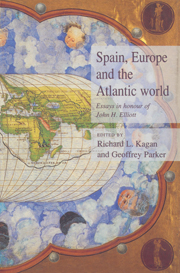Book contents
- Frontmatter
- Contents
- Notes on contributors
- Acknowledgements
- List of abbreviations
- Sir John Elliott: an appreciation
- Introduction
- PART I Power and propaganda: the world of the court
- PART II The pattern of society: community and identity in Habsburg Spain
- PART III Spain and its empire
- 10 David or Goliath? Philip II and his world in the 1580s
- 11 Olivares, the Cardinal-Infante and Spain's strategy in the Low Countries (1635–1643): the road to Rocroi
- 12 Conquest after the conquest: the rise of Spanish domination in America
- 13 Heeding Heraclides: empire and its discontents, 1619–1812
- 14 Why were Spain's special overseas laws never enacted?
- Index
13 - Heeding Heraclides: empire and its discontents, 1619–1812
Published online by Cambridge University Press: 04 August 2010
- Frontmatter
- Contents
- Notes on contributors
- Acknowledgements
- List of abbreviations
- Sir John Elliott: an appreciation
- Introduction
- PART I Power and propaganda: the world of the court
- PART II The pattern of society: community and identity in Habsburg Spain
- PART III Spain and its empire
- 10 David or Goliath? Philip II and his world in the 1580s
- 11 Olivares, the Cardinal-Infante and Spain's strategy in the Low Countries (1635–1643): the road to Rocroi
- 12 Conquest after the conquest: the rise of Spanish domination in America
- 13 Heeding Heraclides: empire and its discontents, 1619–1812
- 14 Why were Spain's special overseas laws never enacted?
- Index
Summary
Heraclides of Byzantium, ambassador of Antiochus, presented himself to Publius Scipio and warned him: ‘Let the Romans limit their Empire to Europe, that even this was very large; that it was possible to gain it part by part more easily than to hold the whole.’ Scipio was unimpressed. ‘What seemed to the ambassador great incentives for conducting peace’, Livy tells us, ‘seemed unimportant to the Romans.’ But Heraclides' words would return to haunt later European empire-builders who could, with hindsight, see all too clearly that Scipio should have been a little more attentive to what the ambassador had told him.
None of the early modern European empires were, perhaps, more conscious of this than the Spanish and none more prone to self-doubt and to self-reflection. The reasons for this are not hard to find. Spain was driven for longer and more consistently than its French, British and later Dutch, rivals by an ideology of evangelization, an ideology which demanded continual re-assessment of both the behaviour and the motives of those engaged in the colonizing project. It was also simply the largest – larger, as its ideologues rarely tired of stressing, even than Rome itself been; its territories were the most widely distributed and embraced the greatest number of different cultures. Uniquely, it also possessed an extensive European base. From the accession of Charles V to that of Philip V, the centre of the ‘Spanish monarchy’ – for as John Elliott has frequently reminded us, if this was an ‘empire’ in fact, it never was in name – was always Europe: the Netherlands, Portugal between 1580 and 1640 and above all Italy, ‘the garden of the Empire’, as Mercurio de Gattinara, echoing Dante, once called it.
- Type
- Chapter
- Information
- Spain, Europe and the AtlanticEssays in Honour of John H. Elliott, pp. 316 - 333Publisher: Cambridge University PressPrint publication year: 1995
- 11
- Cited by



